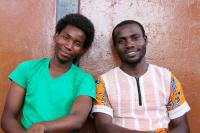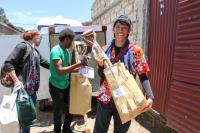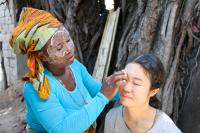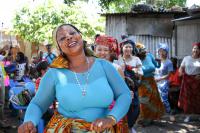Maputo, Mozambique: Understanding the History and Experiencing the Vibrancy of the Mafalala District and its People

Nery Pires and another IVERCA staff member sit in the shade by the local primary school which IVERCA supports.
On January 6, 2017, Peace Boat docked in Maputo, Mozambique—a historic African capital which displays a fascinating blend of cultures, influenced in part by the Arabs who came to the country in the eighth century and the Portuguese who colonized the nation for over 400 years. A group of Peace Boat participants took part in a study and exchange programme to learn about the history and people of the Mafalala district of Maputo, an area famed for its connection with Mozambique’s struggle for independence from Portuguese rule during the twentieth century.

Students at the local primary school in Mafalala perform a dance which they learned with the help of IVERCA.
Nery Pires of IVERCA—a local NGO which provides tours of the Mafalala district and channels its revenue back into the community—was the group’s guide for the day.
As he led the group along narrow paths, weaving between dilapidated tin houses, he explained that the Portuguese colonizers imposed a system of racial segregation in Mozambique—in 1899 a law was passed which divided the population into “non-indigenous” who had full Portuguese citizenship rights, and “indigenous”, who were subject to the provisions of colonial law and were heavily discriminated against.
Mafalala was one neighbourhood to which indigenous Mozambicans were confined, as they were not permitted to live in concrete houses alongside their white counterparts.

Peace Boat participants carry support goods to the IVERCA head office in the Mafalala neighbourhood.
The walking tour introduced participants to prominent figures in the struggle for equal rights and independence, including Noemia De Sousa, a poet who used her literary talent to rally support for the cause, and Samora Machel, the first president of Mozambique after its independence in 1975.
Although the former houses of these figures still stand, Mr Pires lamented the lack of any historic plaques to educate local people and tourists about these important cultural buildings. The walking tour ended at the oldest primary school in Mafalala, which IVERCA supports by providing extracurricular activities like traditional dance workshops and poetry lessons to the students, as well as a growing library which it funded. A group of the students demonstrated their impressive dance skills by giving an energetic performance, and then invited Peace Boat participants to join in the fun.

A Peace Boat participant has her face painted with ground wood by a traditional dancer from Mafalala.
Participants then walked to IVERCA’s head office to donate support goods—including items such as spades and sports equipment. These goods were previously collected in Japan as part of the United People’s Alliance to be distributed by IVERCA to the Mafalala community.
It was then time to meet Tufo da Mafalala—a traditional Mozambican dance group composed of women dressed in technicoloured kapulanas (cloth tied into a skirt) and headscarves.
Participants tried on kapulanas, and several had their faces painted with ground wood, just like the dancers. Everyone enthusiastically danced together as the women sang animated songs which, according to Mr Pires, highlighted social issues of the Mafalala community and wider Mozambican culture.

Peace Boat participants dance merrily with Tufo da Mafalala, a traditional Mozambican dance group.
The day ended with a sumptuous lunch of chicken, mashed corn and matapa (a stew made of coconut and cassava leaves) enjoyed in the sunshine to the sounds of live Marabenta—the music which symbolized the liberation movement during the nineteen sixties and seventies.
Momoto Sachiyo, a Peace Boat participant, commented on the day’s events: “I was so happy to see the children at the school smiling and enjoying themselves. I wish we could have had more time to dance and play with them. I hope that IVERCA can continue to assist the Mafalala community in years to come.”
